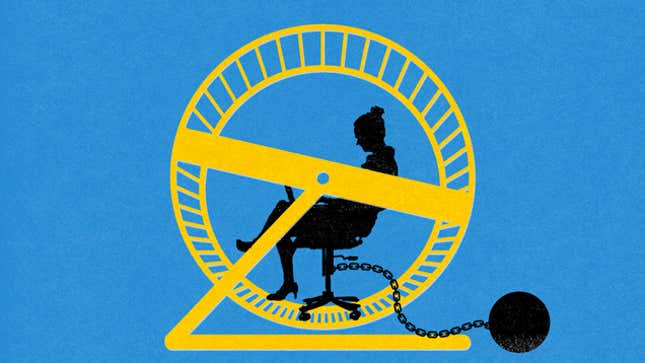What It's Like When Your Job Actually Treats You Like an Adult
Latest

I’ve worked a fast food drive-thru, waited tables, baked bread, slogged it out in corporate copyediting, worked at an alt-weekly, juggled freelance, and this one time I worked at a Ponderosa for three days. Looking back, only two of those jobs offered adult-like working conditions: Produce results, and we won’t hassle you.
It seems so simple, and yet, it’s so very rare. More often than not, I’ve been nitpicked over getting to work five minutes late, or taking a lunch two minutes over the allotted 30, for being sick, for having a doctor’s appointment — in all these instances the issue was never with my output, but with the fact that on some level, I had the gall to act human or have needs, refusing to be chained to my desk for every possible second.
According to a new book called Why Work Sucks and How to Fix It covered over at Slate, the authors have termed this rampant workplace vibing “sludge.” (I prefer “bullshit from the man.”)
Sludge is any comment that’s meant to make a co-worker feel guilty about process rather than results. For example: “Nice of you to join us, Judy,” when Judy arrives at the office a little late in the morning. Or: “I wish I had kids like Bill. He never has to be at work,” when Bill leaves early to see his daughter’s school play. These sorts of comments reinforce an outdated view of the relationship between a knowledge worker’s time spent at a desk and his overall productivity.
We’ve all gotten this shit right? It is pervasive. I got sludge for having mono, for not wanting to pull double weekend shifts at one job because I have a kid, for not coming into work once during an ice storm because I literally couldn’t get my car out of the driveway.
Rather than look at simply employee results — does he/she do the work required and do it well, and on time? — employee value seems to be far more tied to the appearance of work (showing up early or staying late, “looking busy”), or personality, or subterfuge.
-

-

-

-

-

-

-

-

-

-

-

-

-

-

-

-

-

-

-

-

-

-

-

-

-

-

-

-

-

-

-

-

-

-

-

-

-

-

-

-








































